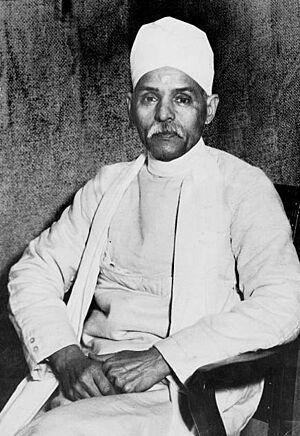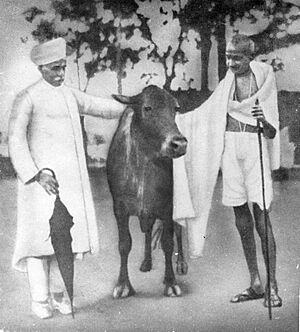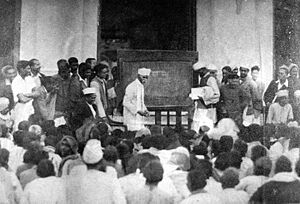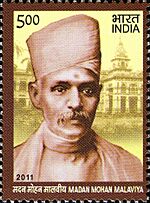Madan Mohan Malaviya facts for kids
Quick facts for kids
Madan Mohan Malaviya
|
|
|---|---|
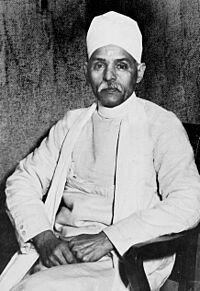 |
|
| 3rd Vice-Chancellor of Banaras Hindu University | |
| In office 1919–1938 |
|
| Preceded by | P. S. Sivaswami Iyer |
| Succeeded by | Sarvepalli Radhakrishnan |
| President of the Indian National Congress | |
| In office 1909–1910 |
|
| Preceded by | Rash Behari Ghosh |
| Succeeded by | William Wedderburn |
| In office 1918 |
|
| Preceded by | Annie Besant |
| Succeeded by | Syed Hasan Imam |
| In office 1932–1933 |
|
| Preceded by | Vallabhbhai Patel |
| Succeeded by | Nellie Sengupta |
| Personal details | |
| Born | 25 December 1861 Allahabad, North-Western Provinces, British India (present-day Prayagraj, Uttar Pradesh, India) |
| Died | 12 November 1946 (aged 84) Allahabad, United Provinces, British India (present-day Prayagraj, Uttar Pradesh, India) |
| Political party | Congress Nationalist Party Akhil Bharat Hindu Mahasabha |
| Other political affiliations |
Indian National Congress (formerly) |
| Spouse | Kumari Kundan Devi Malaviya |
| Children | 6 (including Govind Malaviya) |
| Education | University of Calcutta (BA) |
| Profession | |
| Awards | Bharat Ratna (2015) (posthumous) |
| Signature |  |
Madan Mohan Malaviya (born December 25, 1861 – died November 12, 1946) was an important Indian leader. He was a smart scholar, a reformer in education, and a politician. He played a big part in India's fight for independence from British rule.
He was chosen as the president of the Indian National Congress four times. He also started the Akhil Bharat Hindu Mahasabha. People often called him Pandit, which is a title showing great respect.
Malaviya worked hard to bring modern education to Indians. He helped create the famous Banaras Hindu University (BHU) in Varanasi in 1916. This university is one of the largest in Asia. It has over 40,000 students studying many different subjects. He was the vice-chancellor (a top leader) of BHU from 1919 to 1938.
He was also one of the people who started The Bharat Scouts and Guides in India. Malaviya founded an important English newspaper called The Leader in 1919. He was also the chairman of Hindustan Times from 1924 to 1946. Thanks to his efforts, the Hindi version of the newspaper, Hindustan Dainik, was launched in 1936.
After he passed away, Malaviya received India's highest civilian award, the Bharat Ratna. This honor was given to him on December 24, 2014.
Early Life and Schooling
Madan Mohan Malaviya was born in Prayagraj, India, on December 25, 1861. His family were Gaur Brahmins. His father was Brijnath Malaviya and his mother was Moona Devi. His family came from a place called Malwa in Madhya Pradesh. Because of this, they became known as 'Malaviya'.
He loved the Malwa region very much. So, he chose "Malaviya" as his last name instead of "Chaturvedi". When he was sixteen, he married Kundan Devi from Mirzapur. His family was known for their knowledge of Hindu scriptures and Sanskrit. His father was also a scholar and used to recite the Srimad Bhagavatam.
Malaviya started school at age five. He went to several schools, including Allahabad Zila School. There, he began writing poems using the pen name Makarand. These poems were published in magazines.
In 1879, he finished his schooling from Muir Central College. This college is now known as the University of Allahabad. A kind principal helped him with a monthly scholarship. This allowed him to finish his B.A. degree at the University of Calcutta.
Malaviya wanted to study for a Master's degree in Sanskrit. However, his family needed him to work. His father wanted him to continue the family tradition of reciting religious texts. In July 1884, Madan Mohan Malaviya started working as a teacher. He taught at the Government High School in Allahabad.
Political Journey
Malaviya began his political career in 1886. He gave a speech at the Indian National Congress meeting in Calcutta. He quickly became one of the most important political leaders of his time. He was elected Congress president four times.
In December 1886, he spoke about representation in councils. His speech impressed many, including Raja Rampal Singh. The Raja owned a Hindi weekly newspaper called Hindustan. He asked Malaviya to become its editor. In July 1887, Malaviya left his teaching job. He became the editor of the nationalist weekly.
After two and a half years, he left to study law in Allahabad. He also became a co-editor of The Indian Opinion. After finishing his law degree, he started practicing law in 1891. By 1893, he was working at the Allahabad High Court.
Malaviya became the President of the Indian National Congress in 1909 and again in 1918. He was a moderate leader. He did not agree with separate voting groups for Muslims in the Lucknow Pact of 1916. Mahatma Gandhi gave him the special title "Mahamana".
In 1911, Malaviya stopped practicing law. He wanted to focus on education and social work. But he made an exception once. In the Chauri Chaura incident, 177 freedom fighters were sentenced to be hanged. Malaviya defended them in court. He helped 156 of them get acquitted (found not guilty). He lived a simple life, relying on society's support.
He was a member of the Imperial Legislative Council from 1912 to 1919. This council later became the Central Legislative Assembly. He remained a member until 1926. Malaviya was important in the Non-cooperation movement. He disagreed with Congress joining the Khilafat Movement.
In 1928, he protested against the Simon Commission. This commission was set up by the British to plan India's future. He also encouraged people to "Buy Indian" products in 1932. Malaviya attended the Second Round Table Conference in 1931.
During the Salt March, he was arrested in Delhi in 1932. He was arrested just days after becoming Congress President. In 1933, he was again appointed Congress President in Calcutta. Before India's independence, Malaviya was the only leader to be Congress President four times.
On September 24, 1932, the Poona Pact was signed. This agreement was between B. R. Ambedkar (for the "depressed classes") and Mahatma Gandhi. It gave reserved seats for the "depressed classes" (now called Scheduled Castes and Tribes) in the legislatures. This was a big step for their rights.
Malaviya and Madhav Shrihari Aney left the Congress. They started the Congress Nationalist Party. This was because they disagreed with the Communal Award. Their party won 12 seats in the 1934 elections.
Journalism Career
Malaviya started his journalism work in 1887. He became the editor of the Hindi daily Hindostan. Raja Rampal Singh was impressed by Malaviya's speech in 1886. He asked Malaviya to take on this role.
In 1889, he became the editor of "Indian Opinion". Later, he started his own Hindi weekly, "Abhyudaya" (1907–1909). His poems, called sawaiyas, were published around 1883–84. He used the pen name 'Makrand'. His articles on religion and current events appeared in 'Hindi Pradeepa'.
When the British government made new laws about newspapers in 1908 and 1910, Malaviya fought against them. He organized a conference in Allahabad. He realized he needed an English newspaper to spread his message. So, with help from Motilal Nehru, he started "The Leader" in 1909. He was its editor from 1909 to 1911.
In 1910, Malaviya also started the Hindi paper 'Maryada'.
In 1924, Malaviya, with other leaders and industrialist Ghanshyam Das Birla, bought The Hindustan Times. This saved the newspaper from closing. Malaviya raised money for it, with Birla contributing most. He was the Chairman of Hindustan Times from 1924 to 1946. His efforts led to the launch of its Hindi edition, 'Hindustan', in 1936.
In 1933, Malaviya started Sanatana Dharma. This was a magazine from BHU focused on religious topics.
Legal Work
In 1891, Malaviya finished his law degree from Allahabad University. He began working as a lawyer in Allahabad District Court. By 1893, he was practicing at the High Court. He became known as one of the best lawyers there. In 1911, on his 50th birthday, he stopped practicing law. He wanted to dedicate his life to serving the nation.
Famous lawyers praised his skills. Sir Tej Bahadur Sapru called him "a brilliant Civil Lawyer". Sir Mirza Ismail said Malaviya would have been "an ornament to the legal profession" if he had continued.
Malaviya only wore his lawyer's robe one more time. This was in 1924, after the Chauri Chaura incident. In this event, a police station was attacked in 1922. As a result, Mahatma Gandhi stopped the Non-cooperation movement. A court had sentenced 170 people to death for the attack. Malaviya defended them in the Allahabad High Court. He managed to save 155 of them. The High Court also recommended mercy for the remaining 15. Their death sentences were changed to life imprisonment.
Banaras Hindu University
In April 1911, Annie Besant and Malaviya decided to work together. Their goal was to create a Hindu University in Varanasi. Besant's Central Hindu College, founded in 1898, agreed to become part of the new university. This was a condition set by the government.
So, Banaras Hindu University (BHU) was established in 1916. It was created through a law called the 'Banaras Hindu University Act of 1915'. Today, it is a very important learning institution in India. In 1939, Malaviya left his role as Vice-Chancellor of BHU. S. Radhakrishnan, who later became the President of India, took over.
BHU is spread over a huge area (16.5 square kilometers). It has about 30,000 students. It is the largest residential university in Asia.
Malaviya's son, Pandit Govind Malaviya, was also Vice-Chancellor of BHU from 1948 to 1951. His grandson, Justice Giridhar Malaviya, is currently the Chancellor of BHU since 2018.
Social Work
Malaviya started Ganga Mahasabha to protect the Ganga river. He wanted to stop dams from being built on it. He convinced the British government to sign an agreement in 1916. This agreement, called Aviral Ganga Raksha Samjhuata 1916, ensured the Ganga's free flow in Haridwar.
Malaviya also worked hard to end untouchability. He helped guide the Harijan movement. The Harijan Sevak Sangh was founded in 1933, with Malaviya leading the meeting.
He believed that if you accept the inner goodness of a person's soul, you or your religion cannot be made impure by touching or being with anyone.
To fight untouchability, Malaviya used a Hindu method. He gave Mantradīkshā (a special blessing or initiation) to those considered untouchable. He said that mantras would help them improve socially, politically, and spiritually. He worked to remove caste barriers in temples and other social places. Malaviya played a big part in making sure that so-called untouchables could enter any Hindu temple.
In March 1936, a Hindu Dalit leader, P. N. Rajbhoj, and 200 Dalit people wanted to enter the Kalaram Temple. Malaviya, with the temple priests, gave diksha to these people. This allowed them to enter the temple. They then took part in the temple's Rath Yatra (chariot procession).
He also established the Bharati Bhawan Library in Allahabad in 1889. In 1901, Malaviya started a boys' hostel called Hindu Hostel in Allahabad.
Scouting in India
Scouting was first brought to India by Robert Baden Powell. But only British, European, and Anglo-Indian students could join the British Boy Scouts. Scouting for native Indians began after India's independence in 1947.
Newspaper reports showed that an Indian Railways officer, Sri Ram Vajpei, resigned due to racial discrimination. He was highly qualified in scouting. This made Malaviya, who was then President of Congress, learn about the scouting movement. With help from others like Annie Besant, Malaviya started an organization. It was called the All India Seva Samiti under Sewa Bharti. Its purpose was to conduct scouting activities for Indians.
At first, the British did not recognize the scouting education given by the Samiti. But after visiting India, Baden Powell himself supported recognizing Indian Scouting. He saw the good work the association was doing.
Thanks to Malaviya's efforts, scouting groups across India came together. They formed the Hindustan Scouts Association. Later, the Guides association in India, led by Dr. Besant, also joined. This created the Hindustan Scouts and Guides Association.
Malaviya also created a short secret code language in scouting called MAMOMA. This code is now used worldwide. The name "MAMOMA" comes from the first letters of his name.
Lasting Impact
The famous slogan "Satyameva Jayate" (Truth alone triumphs) is also part of Malaviya's legacy. In 1918, when he led the Indian National Congress meeting in Delhi, he declared this phrase as the nation's slogan. It comes from the ancient text Mundaka Upanishad.
Malaviya started the tradition of Aarti (a prayer ritual) at Har ki Pauri in Haridwar. This ritual is performed daily to honor the sacred Ganga river. A small island near the ghat, called Malaviya Dwipa, is named after him. A statue of him stands there.
The Indian Post Office has released stamps in his honor. They did this in 1961 and 2011 to celebrate his 100th and 150th birthdays.
Many places are named after him. These include neighborhoods in Allahabad, Lucknow, Delhi, Dehradun, Bhopal, Durg, and Jaipur. A square in Jabalpur city, Malaviya Chowk, is also named after him. The Malaviya National Institute of Technology (MNIT) in Jaipur and the Madan Mohan Malaviya University of Technology in Gorakhpur are named for him. Hostels at IIT Kharagpur, IIT Roorkee, and BITS Pilani are also called Malaviya Bhawan.
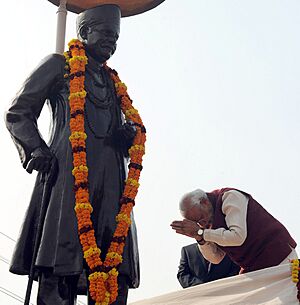
His life-size portrait is in the Central Hall of India's Parliament. A life-size statue was put in front of the BHU main gate in 1961. Another statue was placed in Delhi in 1971.
He is also remembered for helping end the Indian indenture system. This system forced Indians to work in other countries, especially in the Caribbean. His efforts for the Indo-Caribbeans are compared to Mahatma Gandhi's work for Indians in South Africa.
On December 25, 2008, a national memorial called "Malaviya Smriti Bhawan" was opened in Delhi.
In 2011, the Government of India celebrated his 150th birth anniversary. The Prime Minister, Dr Manmohan Singh, announced a Centre for Malaviya Studies at BHU. Scholarships and education awards were also created in his memory.
On December 24, 2014, Madan Mohan Malaviya received the Bharat Ratna. This is India's highest civilian honor.
The Mahamana Express train, which runs between New Delhi and Varanasi, was started in 2016. It is named after Malaviya and has modern facilities.
Images for kids
 | Mary Eliza Mahoney |
 | Susie King Taylor |
 | Ida Gray |
 | Eliza Ann Grier |


